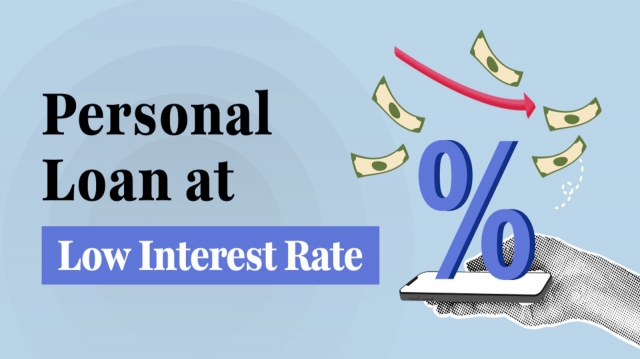For many working individuals, managing sudden expenses can become challenging at times. Whether you need funds for a medical emergency, a family function, or a home upgrade, a Personal Loan for salaried employees can offer quick financial relief. However, the interest rate you get on your loan plays a major role in determining the monthly EMIs and the total loan cost.
Let’s explore how salaried professionals can secure the lowest possible interest rates and what factors truly matter.
Understanding Personal Loan Interest Rates
A Personal Loan for salaried individuals is an unsecured loan, which means it does not involve any collateral, security, or guarantor. Therefore, lenders heavily rely on your income, credit history, and employment stability to decide your interest rate.
When applying for a Personal Loan, you will notice that different lenders offer varying interest rates. Even with the same salary, you may get different rates from various lenders, depending on the lender’s policies. Also, interest rates can be of two types: fixed and floating. Fixed interest rates keep EMIs the same throughout the tenure, while the EMIs may change during the tenure according to the prevailing market rates in a floating rate plan.
Impact of Credit Score on Your Personal Loan Interest Rates
Your credit score is one of the most important factors influencing your loan interest rate. Since a Personal Loan is unsecured, lenders need a strong credit history when determining your approval. While the score ranges from 300 to 900, a score above 700 is considered good and may help you in getting favourable terms. If you have a good credit score, lenders perceive you as a reliable borrower with minimal chances of default.
Here’s how you can improve your credit score:
- Pay your credit card bills and EMIs on time.
- Keep your credit utilisation ratio below 30%.
- Reduce your debt-to-income ratio to show enough disposable income.
- Avoid applying for multiple loans or credit cards within a short span.
- Diversify your credit portfolio with different types of loans and credit products.
If you apply for a Personal Loan for salaried professionals with a strong credit score, you not only increase your approval chances but also strengthen your chances to negotiate better rates and terms.
Ways to Get a Favourable Personal Loan Interest Rate
Whether you plan to apply for a small ₹ 50000 Personal Loan or a higher loan amount of ₹ 30 Lakh, try these ways to get favourable interest rates from the lender:
Choose the Right Loan Amount: The loan amount you borrow largely affects your interest rate. For instance, if you apply for a ₹ 50000 Personal Loan, lenders view it as low risk with minimal chances of default. On the other hand, applying for a larger amount like ₹ 30 Lakh might raise doubts about your repayment capacity.
Show Professional Stability: Lenders prefer applicants with stable employment and consistent income. That is why those who have stable employment with reputed employers may get higher loan amounts at attractive interest rates. Most financial institutions also check your work experience when determining your eligibility to ensure professional stability. This stability helps you qualify for a lower interest rate.
Therefore, when salaried professionals apply for a Personal Loan, they should provide accurate and complete employment and income documentation, like proof of employment, payslips, and salary account statements, to strengthen their application.
Opt for a Shorter Loan Tenure: Most reputable lending institutions offer flexible repayment tenures, allowing you to choose an EMI option that aligns with your affordability. The loan tenure you select largely affects your EMIs and the total loan cost you pay. While a longer tenure reduces your EMI, it also increases the total interest cost. If you can manage slightly higher EMIs, choose a shorter tenure to reduce the overall interest cost.
For instance, if you opt for a ₹ 50000 Personal Loan with a repayment period of 12 months*, it will levy a lower interest outgo compared to a 24 months* tenure. Lenders may also offer lower interest rates for shorter durations since the risk of default is lower.
Maintain a Low Debt-to-Income Ratio: Your debt-to-income (DTI) ratio shows how much you pay towards other financial obligations, like loans, credit card bills, etc. If you have a high DTI ratio, lenders might consider you a risky borrower with higher chances of default. Ideally, your other commitments should not exceed 40-50% of your monthly income.
Maintaining a low DTI ratio improves your chances of getting lower rates on your Personal Loan. It shows you have sufficient disposable income to manage loan repayments comfortably.
Conclusion
Securing the lowest Personal Loan interest rate is about preparation, discipline, and smart decision-making. As a salaried professional, you already have the advantage of a steady income. Combine it with a good credit score, job stability, and careful comparison to get a favourable interest rate on your ₹ 50000 Personal Loan.
If you are planning to apply soon, consider reputed lenders like L&T Finance. Check for features like quick approval, flexible tenures, and competitive interest rates meant for salaried individuals before committing to a lender. Whether you need a Personal Loan for salaried employees or a small ₹ 50000 Personal Loan to handle short-term needs, major lenders like L&T Finance can help you achieve your financial goals with ease and confidence.






